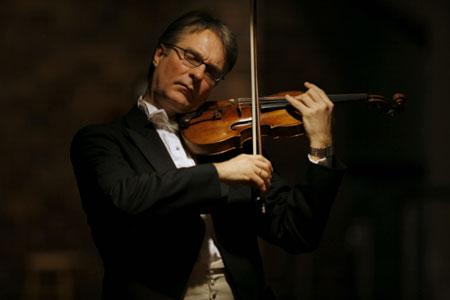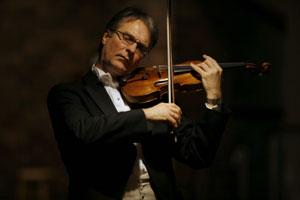
Jonathan Carney
On October 2, 2014 at 7:30 PM, Maestro Julien Benichou and the Mid-Atlantic Symphony Orchestra will be joined by the violinist Jonathan Carney, Concertmaster of the Baltimore Symphony Orchestra. This monumental concert features Viennese musical geniuses, Beethoven and Brahms in two of the 19th century’s major masterpieces-composed 74 years apart.
Born in Bonn, Beethoven moved permanently to Vienna in 1792 to study with Haydn but went on to give piano recitals of his compositions and improvisations and compose most of his opus of chamber music, concertos symphonies and choral music, which were premiered and published there. His greatness was recognized early by patrons, friends and critics, who eagerly attended his concerts and recitals. The 3rd Symphony “Eroica” broke new ground in expression, rhythm, alteration of classic form, progression of movements, harmonies, and use of wind instruments.
Raised in the city of Hamburg, Brahms visited Vienna in 1862 for the winter, and increasingly made Vienna his home. His greatness was recognized in 1853 by Joseph Joachim, violinist and composer, and Robert and Clara Schumann. Schumann wrote that he “was destined to give ideal expression to the times” thus introducing Brahms to the music world. The phrase was daunting in its expectations and it was not until the 1858 premiere of his “German Requiem” composed after his mother’s and Schumann’s death that his reputation and Schumann’s opinion were confirmed. Its success may have given him the confidence to complete his first symphony that he had struggled with for many years and then go on to compose the violin concerto. It could be said that without the path-breaking innovations in the “Eroica” and the inspiration of his close friend, Joseph Joachim, Brahms might never have written his magnificent violin concerto in D major in which feeling dictates the form.
One of the largest-scale and demanding works for violin it combines a classical concerto form with Brahms’ musical language. From the majesty of its first movement, the lyricism of the Adagio to the Hungarian Gypsy rhythms and energy of its finale, Brahms concerto attains a depth of musical expression few works in this genre have attained. Brahms conceived of the work as symphonic in the way the solo and orchestral forces are melded into a uniform musical language. Joachim premiered the work on Jan. 1, 1879 and though it was not an immediate success, it has become a standard equal to Beethoven’s violin concerto.
Jonathan Carney, the violin soloist, hailed as one of the great concertmasters of his generation is in his 13th season with the BSO. He is a graduate of the Juilliard School of Music, where he received his bachelor’s and master’s degrees and was awarded a Fellowship to continue his studies at the Royal College of Music in London. After an acclaimed world tour as concertmaster and soloist he was invited by the principal conductor, Vladimir Ashkenazy to become concertmaster of the Royal Philharmonic in 1991, and simultaneously the Bournemouth Symphony (1993 to 2000) and Basque National Symphony in (1995 to 2002) He is a prolific recording artist of both the standard classical repertoire and contemporary compositions. With a strong belief in musical education, he is artistic director for the Maryland Classic Youth Orchestras and serves on the Board of the Baltimore School for the Arts.
Following the intermission Benichou and the orchestra will present one of the most remarkable and revolutionary works of art we have. Beethoven’s Third Symphony, the “Eroica” is a cutting edge piece of great artistic courage in which the composer did for music what Napoleon and the French Revolution did for society by turning tradition upside down.
This symphony originally was to be a tribute to Napoleon Bonaparte. Upon hearing that his hero had crowned himself emperor, Beethoven tore up the title page and titled it, “ Heroic Symphony to commemorate the memory of a great man.” It was written in the year after a deep depression over his growing deafness gave way to an astonishing burst of creativity. This was his favorite among his works. In it he envisioned where his music was going and in fact where the music of the future was going.
The Season Premiere concert will be performed Thursday, October 2, 2014 7:30 PM at Easton Church of God, 1009 N. Washington Street on Tickets are available for check or cash at Crackerjacks in Easton or at the door. $38 for adults, for students 18 and under free by reservation. Call 1-888-846-8600 for information and tickets or visit midatlanticsymphony.org to download ticket form.
Other venues: Saturday, October 4, 2014, 7:30 PM Mariner’s Bethel Church, Rt. 26 & Central Ave., Ocean View, DE and on Sunday, October 5, 3 PM Community Church, Rt. 586/Racetrack Rd Ocean Pines, MD
The Mid-Atlantic Symphony Orchestra, a nonprofit organization, is supported by grants from the National Endowment for the Arts, the Maryland State Arts Council, the Talbot County Arts Council, the Worcester County Arts Council, the Community Foundation of the Eastern Shore, the Sussex County Council, The Arts Council of Calvert County, and the Paul M. Angell Family Foundation, the Carl M. Freeman Foundation, the Joshua Freeman Foundation, Van Strum Foundation as well as donations from individuals, organizations, and corporations.



Write a Letter to the Editor on this Article
We encourage readers to offer their point of view on this article by submitting the following form. Editing is sometimes necessary and is done at the discretion of the editorial staff.